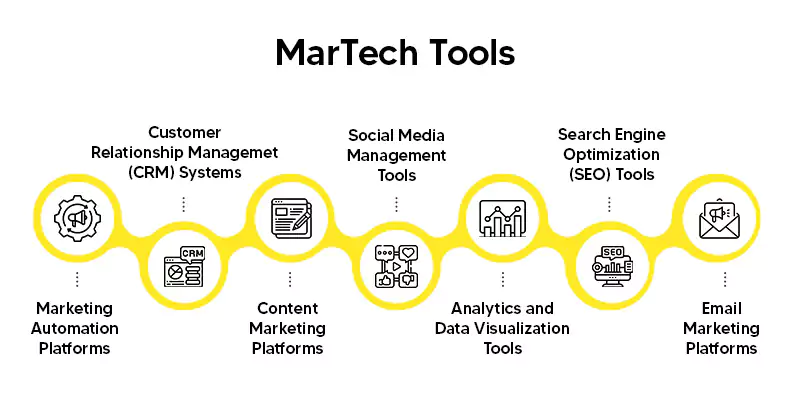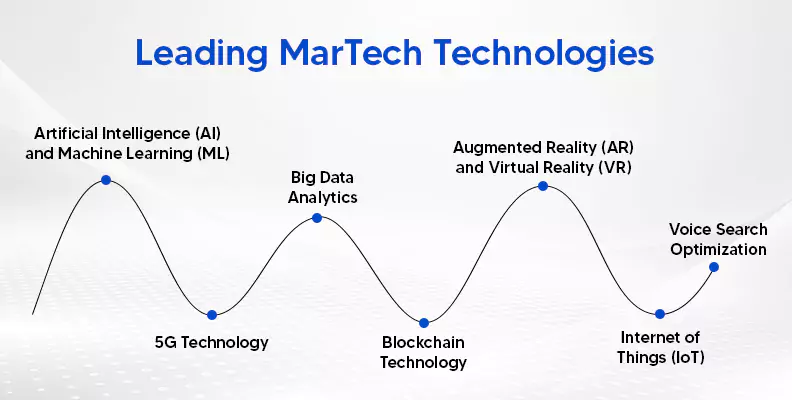Loading.....
A CMO's Guide to Leveraging MarTech for Business Success!
As technology evolves, so does its impact on marketing, with MarTech (Marketing Technology) playing a pivotal role in streamlining processes, enhancing customer experiences, and optimizing campaigns.
So what is MarTech?
It represents the amalgamation of technology and marketing strategies, fostering efficiency and innovation. It includes software, platforms, and applications that empower marketers to automate tasks, analyze data, and enhance overall campaign effectiveness in the ever-evolving digital landscape.
CMOs(Chief Marketing Officers) must leverage MarTech tools to gain insights and achieve a competitive edge. This symbiotic relationship between marketing and technology is indispensable, enabling CMOs to navigate the complexities of the modern business environment with precision and agility.
Let's dwell on the blog to gain valuable insights into the world of Martech and enhance your understanding of this dynamic field.
Why MarTech in Business?
MarTech is a game-changer in enhancing customer engagement. With sophisticated analytics and personalized communication strategies, businesses can now deeply understand customer behaviour, preferences, and journey touchpoints. This results in highly targeted and personalized campaigns, fostering stronger connections, increased brand loyalty, and a competitive edge in the market. The top five benefits of embracing Martech are:
- Enhanced Customer Engagement
- Improved Operational Efficiency
- Data-Driven Decision Making
- Scalability and Flexibility
- ROI Maximization
Navigating MarTech Tools
MarTech tools encompass a diverse set of solutions designed to streamline and enhance various aspects of marketing, from automation platforms and CRM systems to content creation and analytics tools. These tools empower businesses to optimize marketing strategies, engage with audiences effectively, and drive measurable results.
Here are the top 7 popular tools:

- Marketing Automation Platforms: Marketing automation platforms empower businesses to streamline and automate repetitive tasks. From email campaigns and lead nurturing to social media scheduling, these platforms enhance efficiency and allow marketers to focus on strategy and creativity. Popular tools like HubSpot, Marketo, and Pardot enable the creation of personalized, targeted campaigns, resulting in improved customer engagement and increased conversion rates.
- Customer Relationship Management (CRM) Systems: CRM systems are integral for businesses aiming to build and nurture long-term relationships with their customers. These platforms store and manage customer data, providing insights into customer interactions across various touchpoints. Salesforce, Zoho CRM, and HubSpot CRM are renowned examples, offering CMOs and sales teams a comprehensive view of customer behaviour, enabling personalized communication, and fostering customer loyalty.
- Content Marketing Platforms: Content is king, and content marketing platforms play a pivotal role in creating, distributing, and managing content effectively. Tools like WordPress, Contentful, and CoSchedule streamline content creation workflows, facilitate collaboration among team members, and optimize content for search engines. These platforms empower marketers to deliver valuable, relevant content to their target audience, driving engagement and establishing thought leadership.
- Social Media Management Tools: In the age of social media dominance, managing multiple platforms efficiently is crucial for success. Social media management tools such as Hootsuite, Buffer, and Sprout Social allow marketers to schedule posts, monitor brand mentions, and analyze performance metrics. These tools enhance social media presence, foster audience engagement, and provide valuable insights for refining social media strategies.
- Analytics and Data Visualization Tools: Understanding the impact of marketing efforts is essential for making informed decisions. Analytics tools like Google Analytics, Adobe Analytics, and Tableau enable marketers to track and analyze key performance indicators (KPIs). From website traffic and conversion rates to user behaviour, these tools transform raw data into actionable insights, empowering marketers to optimize campaigns and allocate resources strategically.
- Search Engine Optimization (SEO) Tools: For businesses aiming to enhance their online visibility, SEO tools are indispensable. Platforms like SEMrush, Moz, and Ahrefs provide comprehensive insights into keyword rankings, backlink profiles, and on-page SEO elements. By optimizing website content and structure, businesses can improve their search engine rankings, driving organic traffic and increasing the effectiveness of their digital marketing efforts.
- Email Marketing Platforms: Email remains a potent tool in the marketer's arsenal, and email marketing platforms facilitate the creation, automation, and analysis of email campaigns. Leading platforms like Mailchimp, Constant Contact, and SendGrid offer features such as segmentation, personalization, and A/B testing. These tools ensure targeted communication, higher open rates, and increased conversion rates for email campaigns.
Real Life Use Cases Empowering CMOs
-
Customer Journey Optimization
CMOs leverage MarTech to map and optimize the entire customer journey, from initial awareness to post-purchase engagement. Marketing automation platforms, CRM systems, and analytics tools enable CMOs to gain holistic insights into customer interactions. By understanding touchpoints and pain points throughout the journey, CMOs can tailor marketing strategies to create seamless, personalized experiences, ultimately driving customer satisfaction and loyalty. -
Personalized Content Delivery
Empowers CMOs to move beyond generic mass messaging and embrace personalized content delivery. Utilizing data-driven insights, CMOs can segment their audience and deliver tailored content that resonates with specific demographics or customer segments. This not only enhances engagement but also boosts conversion rates as consumers are more likely to respond to content that speaks directly to their needs and interests. -
Marketing Analytics and Attribution
CMOs can harness the power of advanced analytics tools to measure and attribute the impact of their marketing efforts. From tracking the performance of individual campaigns to understanding the contribution of various channels, marketing analytics provides CMOs with the data needed to make informed decisions. This data-driven approach ensures optimal resource allocation, allowing CMOs to invest in strategies and channels that deliver the highest return on investment. -
Social Media Management
CMOs recognize the pivotal role of social media in today's marketing landscape. MarTech offers robust social media management tools that enable CMOs to schedule posts, analyze engagement metrics, and monitor brand mentions. These tools not only streamline social media workflows but also help CMOs stay agile in responding to trends and customer feedback, fostering a dynamic and responsive online presence. -
Customer Retention Strategies
MarTech equips CMOs with the tools to implement effective customer retention strategies. Through predictive analytics and customer segmentation, CMOs can identify at-risk customers and proactively address their needs. Loyalty programs, email marketing automation, and personalized communication strategies enhance customer satisfaction, fostering long-term relationships and increasing customer lifetime value. -
Marketing Collaboration Platforms
Collaboration is key to successful marketing endeavours, and MarTech provides CMOs with platforms that facilitate seamless communication and collaboration among team members. From project management tools to communication platforms, MarTech streamlines workflows ensures accountability, and enhances team productivity, allowing CMOs to execute campaigns with efficiency and agility. -
Marketing Compliance and Security
In an era of heightened data privacy concerns, CMOs leverage MarTech to ensure marketing practices comply with regulations and safeguard sensitive information. MarTech solutions offer robust security features, encryption protocols, and compliance monitoring tools. This not only protects the brand's reputation but also instils trust among customers, reinforcing the importance of ethical and secure marketing practices.
Leading MarTech Technologies

- Artificial Intelligence (AI) and Machine Learning (ML): At the forefront of MarTech evolution, AI and ML are transforming marketing processes by automating tasks, predicting customer behaviour, and personalizing experiences. From predictive analytics that forecast campaign success to chatbots that enhance customer interactions, AI and ML are integral components driving efficiency and effectiveness in MarTech solutions.
- Big Data Analytics: The abundance of data in the digital age has made Big Data analytics a cornerstone of MarTech. Analyzing vast datasets enables marketers to gain valuable insights into customer behaviour, preferences, and trends. By harnessing this information, businesses can make informed decisions, refine targeting strategies, and create more personalized and impactful marketing campaigns.
- Blockchain Technology: Blockchain is making inroads into MarTech, addressing challenges related to transparency, security, and trust i. This decentralized and secure technology is particularly beneficial for verifying the authenticity of digital assets, preventing ad fraud, and ensuring the integrity of customer data. As blockchain continues to evolve, its role in enhancing the reliability of MarTech solutions becomes increasingly significant.
- Internet of Things (IoT):IoT is expanding the horizons of MarTech by providing marketers with a wealth of data from interconnected devices. From smart appliances to wearables, IoT-generated data offers insights into consumer behaviour and preferences. Marketers can leverage this information to create highly targeted and contextually relevant campaigns, enhancing the overall customer experience.
- Voice Search Optimization: As voice-activated devices become ubiquitous, optimizing for voice search is a critical aspect of MarTech. Voice search optimization involves adapting marketing strategies to align with the way people naturally speak. MarTech solutions are integrating voice recognition technology to ensure that businesses remain discoverable and relevant in the era of voice-activated search queries.
- Augmented Reality (AR) and Virtual Reality (VR): AR and VR technologies are revolutionizing the way brands engage with their audience. In MarTech, AR and VR are used to create immersive and interactive experiences, allowing consumers to visualize products or services in real-world scenarios. These technologies enhance engagement, drive brand recall, and provide unique opportunities for innovative marketing campaigns.
- 5G Technology:: The advent of 5G technology is set to redefine the capabilities of MarTech solutions. With faster and more reliable connectivity, marketers can deliver high-quality, real-time content to users. This opens up avenues for enhanced mobile experiences, live streaming, and augmented reality applications, providing marketers with new and dynamic ways to connect with their audience.
Conclusion
In essence, the adoption of MarTech is not just a choice; it's a strategic imperative for businesses aspiring to stay ahead and lead in the highly competitive digital landscape. As the blog unfolds the significance of MarTech in enhancing customer engagement, streamlining operations, and leveraging cutting-edge technologies, it underscores that embracing MarTech is the key to unlocking sustained success in the ever-evolving world of marketing.
 Back to blog
Back to blog












